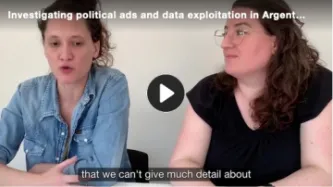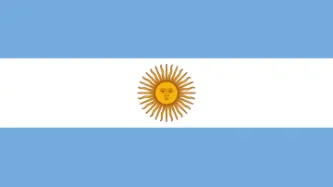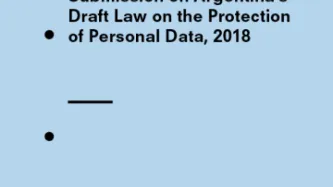Search
Content type: Examples
Companies like the Australian data services company Appen are part of a vast, hidden industry of low-paid workers in some of the globe's cheapest labour markets who label images, video, and text to provide the datasets used to train the algorithms that power new bots. Appen, which has 1 million contributors, includes among its clients Amazon, Microsoft, Google, and Meta. According to Grand View Research, the global data collection and labelling market was valued at $2.22 billion in 2022 and is…
Content type: Examples
The Argentinian startup Nippy offers delivery drivers access to rest stops including free coffee, phone charging stations, and toilets in return for downloading its app and allowing it to sell the data the app collects to partners in insurance, financial services, and telecommunications. The result is to give companies like Mastercard and Movistar insight into gig workers' income in the areas where Nippy operates in Argentina, Mexico, and the Dominican Republic. The services Nippy's rest stops…
Content type: Advocacy
Privacy International responded to the consultation on the proposed data protection bill (the "Bill") to reform the current law 25.326
We welcome the continued efforts by Argentina to provide protections for the right to privacy, already enshrined in the Constitution of Argentina. PI welcomes the main objective of the Bill, namely to regulate the processing of personal data in order to guarantee fully the exercise of data subjects’ rights in accordance with Article 43 of the Constitution (…
Content type: Examples
Documents acquired under the Government Information (Public Access) Act 2009 reveal that staff and student protests against cuts at the University of Sydney were surveilled by both the university administration and police, who have been widely criticised for using excessive force at education protests. The university administration conducted "risk reviews" of protests and looked for links between education protest organisers and other political organisations. Emails include screenshots of…
Content type: Examples
By late June, two months after its launch, Australia’s A$1.5 million CovidSafe app had failed to help authorities identify even a single contact of a confirmed case. In the states of Victoria, New South Wales, South Australia, and Tasmania the app had not picked up any contacts that had not already been identified by human contact tracers, and in Western Australia and Queensland no confirmed cases had downloaded the app. In Victoria, where the virus has been spreading, only just over 30 of 568…
Content type: Examples
The Australian government reported soon after releasing its CovidSafe contact tracing app that the app doesn’t work properly on iPhones because it doesn’t use Apple’s Exposure Notification framework and the Bluetooth functions deteriorate if the app isn’t kept running in the foreground. The government will update the app to use Apple’s framework. The app will store data on Amazon Web Services servers within Australia, although critics have expressed concern that the data could be handed over to…
Content type: Examples
More than 6 million Australians downloaded the government’s COVIDSafe contact tracing app after being told it was necessary to help health officials track future coronavirus outbreaks. In late May, a software developer found a flaw in the app that would allow someone with a relatively simple Bluetooth device to crash the app running on nearby phones so they wouldn’t attempt to pair with other nearby phones and no data would be available to health officials if the phone’s owner becomes infected…
Content type: Video
The incorporation of new technologies to electoral processes is a phenomenon with a global and exponential growth. Despite its benefits, online campaigning is not without challenges, and can pose threats to transparency and equity in electoral competition. Given the role of elections as foundational pillars of the democratic system and a key gateway for the exercise of fundamental civil rights, these implications must be assessed with care and through specific tools.
We at PI, together…
Content type: Examples
The UK government, in collaboration with universities, water companies, and public research bodies, is preparing to launch a national research programme to develop an early warning system for future waves of COVID-19 by detecting the coronavirus in sewage. About half of those infected with SARS-CoV-2 excrete it in their faeces, and enough virus survive to be detectable in untreated water using ultrasensitive PCR analysis. Teams in the UK, several other European countries, Australia, Israel, and…
Content type: Examples
Only 16% of Australians had downloaded the country's COVIDSafe app by May 3, a week after its launch on April 26, even though most said they support the federal government's coronavirus contact tracing app. In an Ipsos poll, 80% of those who said they were unlikely to download the app cited privacy concerns such as who holds and has access to the data, and which country's law applies. The government has said its goal is for at least half of the population to download and install the app.…
Content type: Examples
Two million people downloaded Australia's COVIDSafe app in the first four days it was available; the government's goal is to reach 10 million, or about 40% of the population. Users are asked for a (not necessarily real) name, age, mobile number, and postal code. The app exchanges a Bluetooth handshake when it comes within 1.5 metres of another app user, then logs the handshake and encrypts the exchange.
The data is used to notify users if they have come within close contact for 15 or more…
Content type: Examples
Police will be barred from accessing metadata collected by Australia's proposed coronavirus contact tracing app, which will be able to identify when users have been 1.5 metres of each other for more than 15 minutes, Australia's government services minister, Stuart Robert, and prime minister, Scott Morrison, have promised. Only state health investigators will access the data, even though experts say that the 2018 telecommunications laws potentially allow law enforcement access. Critics are…
Content type: Examples
The Australian government's planned contact tracing app will reportedly be based on Singapore's TraceTogether, which relies on Bluetooth connections to detect other phones in range and log the results, so that if a phone user tests positive for COVID-19 and consents their close contacts can be alerted by uploading the logs to a centralised server. A second app, ConTrace, is in development for the Public Transport Information and Priority System; the prototype requires no personal information…
Content type: Examples
On request, Vodafone Australia, which has 6 million subscribers nationwide, handed the mobile phone location data of several million Australians to the federal and New South Wales governments to help them monitor whether people are following the social distancing restrictions. The governments, medical experts, and media had previously used the data collected by transport apps such as CityMapper, but the number who use that one app is necessarily limited. Vodafone claimed the data was anonymised…
Content type: Examples
The Western Australia state police force is using drones to deliver audio warnings to enforce the quarantine restrictions placed on some individuals and sending more than 200 officers to patrol the streets to break up gatherings and enforce social distancing in parks, beaches, and cafe strips. The state's premier, Mark McGowan, admitted the measures were extreme, but felt they were necessary to send the message to residents. Police have been granted greater powers to charge people if they…
Content type: Examples
The former Big Brother reality TV star Matías Schrank was arrested by the Cybercrime division of the Misiones provincial police, after publishing tweets that claimed that Eduardo Rovira, the president of the Misiones legislature, had contracted COVID-19 on his recent trip to Thailand and was reckless in not immediately going into quarantine but continuing to hold meetings with other high-level government officials. Schrank was charged under Article. 211 of the Criminal Code, which…
Content type: Examples
The Argentinian company Urbetrack is developing a "Cuidate en casa" (Take Care of Yourself at Home) app that it will pitch to government agencies throughout the country. The goal is to contribute to remediating the health crisis by helping enforce quarantine. The plan is that users will download the app and complete a form with their personal details as chosen by the local authority. The app will then generate a "radial geofence" defined by the local authority, within which the user must stay.…
Content type: Examples
The Argentinian Ministry of Transport, working with the state-owned satellite company ARSAT and the telecoms regulator,ENACOM, proposed to the Executive on 31 March 2020 a platform that uses cell tower data to track people on public transport and ensure they comply with quarantine laws. By 28 March, the Ministry of Security had detained 13,006 people for violating the rules. The government believes that although compliance is high, it will deteriorate if quarantine is extended much longer…
Content type: Examples
The San Francisco-based big data company Grandata has created a heat map to show which areas of Argentina are best complying with the quarantine lockdown. Grandata used an "anonymised" dataset collected from apps that provide third parties with geolocation information. The heat map shows if an individual has moved more than 100 meters from the place where they spend most of their time, apparently without taking into account the socio-economic contexts of different cities, where individuals…
Content type: Examples
Argentina's Public Prosecutor's Office will start installing an app on the smartphones of those who violate government-ordered quarantine in the cities of Santa Fé and Rosario. The app will be installed by the province's Criminal Investigation Agency to track those who are under criminal investigation for violating quarantine. The app will send reports to the the MPA investigation office and coordinated by the Attorney General's Office. Individuals will be required to sign a document…
Content type: Examples
On March 23, Argentina's immigration agency, Dirección Nacional de Migraciones (DNM), announced that anyone arriving in the country would be required to install the free COVID-19 Ministry of Health app on their phone for 14 days to ensure they comply with quarantine rules in order to protect the population. The Office of the Chief of Staff had instructed the DNM to adopt this policy when it launched the app, also on March 23. Since launch, the number of unnecessary permissions the app requests…
Content type: Examples
The self-testing web app issued by Argentina's Secretariat of Public Innovation asks for national ID number, email and phone as mandatory fields in order to submit the test. The Android version requires numerous permissions: calendar, contacts, geolocation data (both network-based and GPS), microphone, camera, full network access; change audio settings, run at startup; draw over other apps, prevent device from sleeping.
Sources:
https://www.argentina.gob.ar/coronavirus/app
https://play.…
Content type: Examples
The free app Testeate, developed by the company Adrómeda in collaboration with the Association of Information and Communication Technologies of Mar del Plata (ATICMA) and the Chamber of Software and Computer Services Companies of Argentina (CESSI) and launched in the Municipality of General Pueyrredón on March 26, is intended to enable direct information exchange between Argentina's National Ministry of Health and the population by offering constantly updated information in any city and…
Content type: Examples
A phone-tracking system used by SAPOL for criminal investigations was used to better understand where a coronavirus-infected 60-year-old couple, who had travelled from Wuhan to visit relatives, roamed in Adelaide in order to identify people who might have been exposed, according to the South Australian police commissioner. Police used a program that only requires a phone number to initiate a download of where the phone has been used; to use it they must meet a legislative threshold…
Content type: Examples
A group of independent developers in Argentina started CoTrack, a public crowdsourced effort to develop an app to track and slow the spread of the virus. CoTrack registers each user's geographic movements and looks for times when they are close to people who have been diagnosed with COVID-19. When there is a confirmed case, a user who has the app can share their data with the community so others can automatically be notified that they should take precautions. The Ministry of Health for the area…
Content type: Examples
An Argentinian crowdsourcing website is collecting information on flights with passengers who were reported as testing positive for COVID-19. Users are asked to enter their email address and the date, airline, and flight number, and tick a box to indicate that someone on their flight was infected. No information is provided on who operates the site, but the terms and conditions indicate that it uses open data flows alongside the collected data.
Source: http://www.checkmyvirusrisk.com/CO/…
Content type: Examples
The body of a 57-year-old was found in the laundry room of her home in Valley View, Adelaide, in September 2016. Her daughter-in-law who was in the house at the time of the murder claimed that she was tied up by a group of men who entered the house and managed to escape when they left. However, the data from the victim's smartwatch did not corroborate her story.The prosecution alleged that the watch had recorded data consistent with a person going into shock and losing consciousness. "The…
Content type: Examples
In February 2019, with a general election expected in May, the Australian government revealed that Australia's main political parties had been hacked by a "sophisticated state actor". The Australian Cyber Security Centre uncovered the hack while investigating a just-revealed hack of the Australian parliament's computer networks. A spokeswoman for China's ministry of foreign affairs denied the suggestion that China was responsible.
https://www.ft.com/content/9de75c4a-331f-11e9-bd3a-8b2a211d90d5…
Content type: State of Privacy
Table of contents
Introduction
Right to Privacy
Communication Surveillance
Data Protection
Identification Schemes
Policies and Sectoral Initiatives
Introduction
Acknowledgement
The State of Privacy in Argentina is the result of an ongoing collaboration by Privacy International and Asociación por los Derechos Civiles (ADC).
Key Privacy Facts
1. Constitutional privacy protections: While Argentina's constitution does not mention the word 'privacy', Section 19 has been taken by the…
Content type: Advocacy
In September 2018, the National Executive sent the proposed Data Protection Bill to the National Congress. The proposed law was directed to the Senate and it will be considered by two commissions: the Commission of Constitutional Affairs (Comision de Asuntos Constitucionales) and the Commission of Rights and Guarantees (Comision de Derechos y Garantías).
Privacy International welcomes the continued efforts by Argentina to provide protections for the right to privacy, already enshrined in the…





